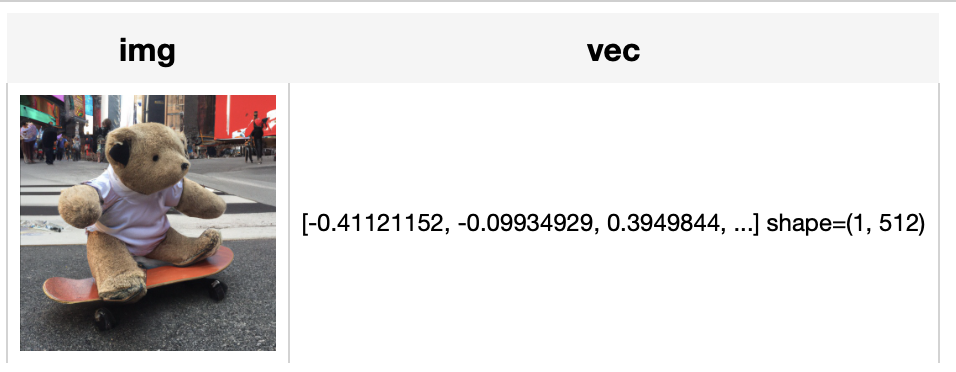
copied
Readme
Files and versions
Updated 1 year ago
image-text-embedding
Image-Text Retrieval Embdding with CLIP
author: David Wang
Description
This operator extracts features for image or text with CLIP which can generate embeddings for text and image by jointly training an image encoder and text encoder to maximize the cosine similarity.
Code Example
Load an image from path './teddy.jpg' to generate an image embedding.
Read the text 'A teddybear on a skateboard in Times Square.' to generate an text embedding.
Write a pipeline with explicit inputs/outputs name specifications:
from towhee import pipe, ops, DataCollection
img_pipe = (
pipe.input('url')
.map('url', 'img', ops.image_decode.cv2_rgb())
.map('img', 'vec', ops.image_text_embedding.clip(model_name='clip_vit_base_patch16', modality='image'))
.output('img', 'vec')
)
text_pipe = (
pipe.input('text')
.map('text', 'vec', ops.image_text_embedding.clip(model_name='clip_vit_base_patch16', modality='text'))
.output('text', 'vec')
)
DataCollection(img_pipe('./teddy.jpg')).show()
DataCollection(text_pipe('A teddybear on a skateboard in Times Square.')).show()


Factory Constructor
Create the operator via the following factory method
clip(model_name, modality)
Parameters:
model_name: str
The model name of CLIP. Supported model names:
- clip_vit_base_patch16
- clip_vit_base_patch32
- clip_vit_large_patch14
- clip_vit_large_patch14_336
modality: str
Which modality(image or text) is used to generate the embedding.
checkpoint_path: str
The path to local checkpoint, defaults to None.
If None, the operator will download and load pretrained model by model_name from Huggingface transformers.
Interface
An image-text embedding operator takes a towhee image or string as input and generate an embedding in ndarray.
save_model(format='pytorch', path='default')
Save model to local with specified format.
Parameters:
format: str
The format of saved model, defaults to 'pytorch'.
path: str
The path where model is saved to. By default, it will save model to the operator directory.
from towhee import ops
op = ops.image_text_embedding.clip(model_name='clip_vit_base_patch16', modality='image').get_op()
op.save_model('onnx', 'test.onnx')
Parameters:
data: towhee.types.Image (a sub-class of numpy.ndarray) or str
The data (image or text based on specified modality) to generate embedding.
Returns: numpy.ndarray
The data embedding extracted by model.
supported_model_names(format=None)
Get a list of all supported model names or supported model names for specified model format.
Parameters:
format: str
The model format such as 'pytorch', 'torchscript'.
from towhee import ops
op = ops.image_text_embedding.clip(model_name='clip_vit_base_patch16', modality='image').get_op()
full_list = op.supported_model_names()
onnx_list = op.supported_model_names(format='onnx')
print(f'Onnx-support/Total Models: {len(onnx_list)}/{len(full_list)}')
Fine-tune
Requirement
If you want to train this operator, besides dependency in requirements.txt, you need install these dependencies. There is also an example to show how to finetune it on a custom dataset.
! python -m pip install datasets evaluate
Get start
import towhee
clip_op = towhee.ops.image_text_embedding.clip(model_name='clip_vit_base_patch16', modality='image').get_op()
data_args = {
'dataset_name': 'ydshieh/coco_dataset_script',
'dataset_config_name': '2017',
'max_seq_length': 77,
'data_dir': path_to_your_coco_dataset,
'image_mean': [0.48145466, 0.4578275, 0.40821073],
'image_std': [0.26862954, 0.26130258, 0.27577711]
}
training_args = {
'num_train_epochs': 3, # you can add epoch number to get a better metric.
'per_device_train_batch_size': 8,
'per_device_eval_batch_size': 8,
'do_train': True,
'do_eval': True,
'remove_unused_columns': False,
'output_dir': './tmp/test-clip',
'overwrite_output_dir': True,
}
model_args = {
'freeze_vision_model': False,
'freeze_text_model': False,
'cache_dir': './cache'
}
clip_op.train(data_args=data_args, training_args=training_args, model_args=model_args)
Dive deep and customize your training
You can change the training script in your customer way. Or your can refer to the original hugging face transformers training examples.
More Resources
- CLIP Object Detection: Merging AI Vision with Language Understanding - Zilliz blog: CLIP Object Detection combines CLIP's text-image understanding with object detection tasks, allowing CLIP to locate and identify objects in images using texts.
- Supercharged Semantic Similarity Search in Production - Zilliz blog: Building a Blazing Fast, Highly Scalable Text-to-Image Search with CLIP embeddings and Milvus, the most advanced open-source vector database.
- The guide to clip-vit-base-patch32 | OpenAI: clip-vit-base-patch32: a CLIP multimodal model variant by OpenAI for image and text embedding.
- Image Embeddings for Enhanced Image Search - Zilliz blog: Image Embeddings are the core of modern computer vision algorithms. Understand their implementation and use cases and explore different image embedding models.
- From Text to Image: Fundamentals of CLIP - Zilliz blog: Search algorithms rely on semantic similarity to retrieve the most relevant results. With the CLIP model, the semantics of texts and images can be connected in a high-dimensional vector space. Read this simple introduction to see how CLIP can help you build a powerful text-to-image service.
|
| 31 Commits | ||
|---|---|---|---|
 .gitattributes
.gitattributes
|
1.1 KiB

|
4 years ago | |
 README.md
README.md
|
6.6 KiB

|
1 year ago | |
 __init__.py
__init__.py
|
770 B

|
3 years ago | |
 clip.py
clip.py
|
10 KiB

|
2 years ago | |
 requirements.txt
requirements.txt
|
78 B

|
3 years ago | |
 tabular1.png
tabular1.png
|
185 KiB

|
4 years ago | |
 tabular2.png
tabular2.png
|
22 KiB

|
4 years ago | |
 train_clip_with_hf_trainer.py
train_clip_with_hf_trainer.py
|
16 KiB

|
3 years ago | |
 vec1.png
vec1.png
|
13 KiB

|
4 years ago | |
 vec2.png
vec2.png
|
13 KiB

|
4 years ago | |
